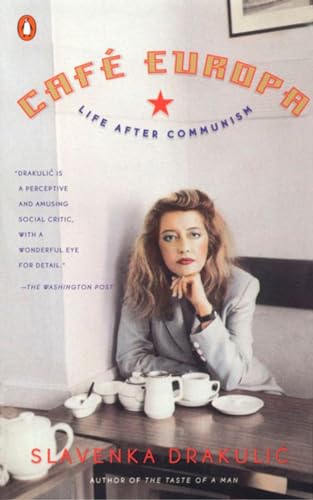
Sinopsis
“Slavenka Drakulic is a journalist and writer whose voice belongs to the world.” —Gloria Steinem
Today in Eastern Europe the architectural work of revolution is complete: the old order has been replaced by various forms of free market economy and de jure democracy. But as Slavenka Drakulic observes, "in everyday life, the revolution consists much more of the small things—of sounds, looks and images." In this brilliant work of political reportage, filtered through her own experience, we see that Europe remains a divided continent. In the place of the fallen Berlin Wall there is a chasm between East and West, consisting of the different way people continue to live and understand the world. Little bits—or intimations—of the West are gradually making their way east: boutiques carrying Levis and tiny food shops called "Supermarket" are multiplying on main boulevards. Despite the fact that Drakulic can find a Cafe Europa, complete with Viennese-style coffee and Western decor, in just about every Eastern European city, the acceptance of the East by the rest of Europe continues to prove much more elusive.
"Sinopsis" puede pertenecer a otra edición de este libro.
Acerca del autor
Slavenka Drakulic was born in Croatia in 1949. The author of several works of nonfiction and novels, she has written for The New York Times, The Nation, The New Republic, and numerous publications around the world.
De la contraportada
Today in Eastern Europe the architectural work of revolution is complete: the old order has been replaced by various forms of free-market economy and de jure democracy. But as Slavenka Drakulic observes, "in everyday life, the revolution consists much more of the small things - of sounds, looks and images. In this brilliant work of political reportage filtered through her own experience, we see that Europe remains a divided continent. In the place of the fallen Berlin Wall, there is a chasm between East and West, consisting of the different way people continue to live and understand the world. Are these differences a communist legacy, or do they run even deeper? What divides us today? To say simply that it is the understanding of the past, or a different concept of time, is not enough. But a visitor to this part of the world will soon discover that the Eastern Europeans live in another time zone. They live in the twentieth century, but at the same time they inhabit a past full of myths and fairy tales, of blood and national belonging.
"Sobre este título" puede pertenecer a otra edición de este libro.
Otras ediciones populares con el mismo título
Resultados de la búsqueda para Café Europa: Life After Communism
Cafe Europa Life After Communi
Librería: World of Books (was SecondSale), Montgomery, IL, Estados Unidos de America
Condición: Acceptable. Item in good condition. Textbooks may not include supplemental items i.e. CDs, access codes etc. Nº de ref. del artículo: 00064684435
Comprar usado
Cantidad disponible: 1 disponibles
Cafe Europa Life After Communi
Librería: World of Books (was SecondSale), Montgomery, IL, Estados Unidos de America
Condición: Good. Item in good condition. Textbooks may not include supplemental items i.e. CDs, access codes etc. Nº de ref. del artículo: 00064041899
Comprar usado
Cantidad disponible: 7 disponibles
Café Europa: Life After Communism
Librería: Zoom Books East, Glendale Heights, IL, Estados Unidos de America
Condición: acceptable. Book is in acceptable condition and shows signs of wear. Book may also include underlining highlighting. The book can also include "From the library of" labels. May not contain miscellaneous items toys, dvds, etc. . We offer 100% money back guarantee and 24 7 customer service. Nº de ref. del artículo: ZEV.0140277722.A
Comprar usado
Cantidad disponible: 1 disponibles
Cafà Europa: Life After Communism
Librería: Seattle Goodwill, Seattle, WA, Estados Unidos de America
paperback. Condición: Good. Nº de ref. del artículo: mon0000086731
Comprar usado
Cantidad disponible: 1 disponibles
Café Europa : Life after Communism
Librería: Better World Books, Mishawaka, IN, Estados Unidos de America
Condición: Good. Former library book; may include library markings. Used book that is in clean, average condition without any missing pages. Nº de ref. del artículo: 7809037-6
Comprar usado
Cantidad disponible: 2 disponibles
Café Europa : Life after Communism
Librería: Better World Books, Mishawaka, IN, Estados Unidos de America
Condición: Good. Used book that is in clean, average condition without any missing pages. Nº de ref. del artículo: 4256189-6
Comprar usado
Cantidad disponible: 3 disponibles
Café Europa: Life After Communism
Librería: ZBK Books, Carlstadt, NJ, Estados Unidos de America
Condición: acceptable. Fast & Free Shipping â" A well-used but reliable copy with all text fully readable. Pages and cover remain intact, though wear such as notes, highlighting, bends, or library marks may be present. Supplemental items like CDs or access codes may not be included. Nº de ref. del artículo: ZWV.0140277722.A
Comprar usado
Cantidad disponible: 1 disponibles
Cafà Europa: Life After Communism
Librería: ThriftBooks-Atlanta, AUSTELL, GA, Estados Unidos de America
Paperback. Condición: Good. No Jacket. Pages can have notes/highlighting. Spine may show signs of wear. ~ ThriftBooks: Read More, Spend Less. Nº de ref. del artículo: G0140277722I3N00
Comprar usado
Cantidad disponible: 2 disponibles
Cafà Europa: Life After Communism
Librería: ThriftBooks-Phoenix, Phoenix, AZ, Estados Unidos de America
Paperback. Condición: Good. No Jacket. Pages can have notes/highlighting. Spine may show signs of wear. ~ ThriftBooks: Read More, Spend Less. Nº de ref. del artículo: G0140277722I3N00
Comprar usado
Cantidad disponible: 1 disponibles
Cafà Europa: Life After Communism
Librería: ThriftBooks-Reno, Reno, NV, Estados Unidos de America
Paperback. Condición: Good. No Jacket. Pages can have notes/highlighting. Spine may show signs of wear. ~ ThriftBooks: Read More, Spend Less. Nº de ref. del artículo: G0140277722I3N00
Comprar usado
Cantidad disponible: 2 disponibles

